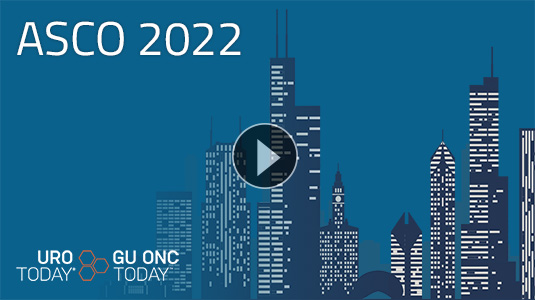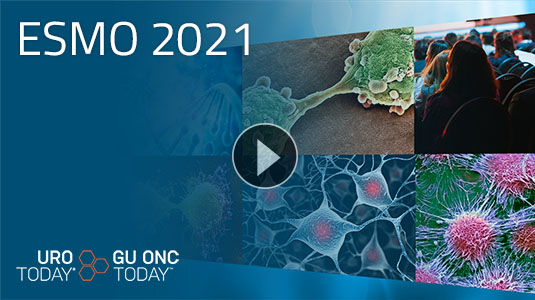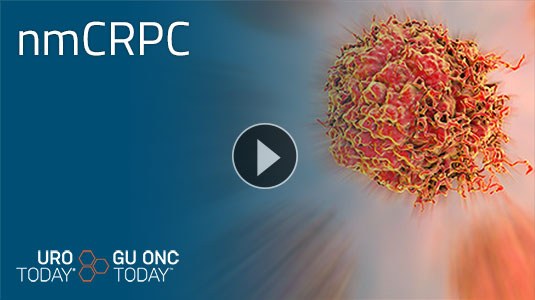ESMO 2024: Does Lower Serum Testosterone Predict Metastases-Free Survival in nmCRPC Patients Treated with Novel Antiandrogens? a Post-Hoc Analysis of SPARTAN and ARAMIS
Presented by Xudong Ni, MD
The 2024 ESMO annual meeting included a session on prostate cancer, featuring a presentation by Dr. Xudong Ni discussing whether lower serum testosterone predicts metastases-free survival in nmCRPC patients treated with novel antiandrogens. This study was a retrospective analysis based on two phase III clinical trials (SPARTAN,
1 ARAMIS
2).
Read More
ASCO 2024: Association Between Prostate-Specific Antigen (PSA) Level 0.2 ng/mL and Risk of Radiological Progression in Patients with Nonmetastatic Castration-Resistant Prostate Cancer (nmCRPC): Follow-up Analysis of ARAMIS
Presented by Alicia K. Morgans, MD, MPH
The 2024 ASCO Annual Meeting held in Chicago, IL was host to a prostate, testicular, and penile cancers poster session. Dr. Alicia Morgans presented the results of a follow-up analysis of ARAMIS evaluating the association between PSA level <0.2 ng/ml and risk of radiological progression in patients with non-metastatic castration-resistant prostate cancer (nmCRPC).
Read More
ESMO 2023: Health-Related Quality of Life Deterioration-Free Survival by PSA Decline in Darolutamide-Treated Patients with Nonmetastatic Castration-Resistant Prostate Cancer from ARAMIS
Presented by Alicia K. Morgans, MD, MPH
The 2023 European Society of Medical Oncology (ESMO) Annual Congress held in Madrid, Spain between October 20
th and 24
th, 2023 was host to a prostate cancer abstracts poster session. Dr. Alicia Morgans presented the results of an ad-hoc analysis from ARAMIS evaluating the health-related quality of life deterioration-free survival by PSA decline in darolutamide-treated patients with nonmetastatic castrate-resistant prostate cancer (nmCRPC).
Read More
AUA 2023: Treatment Duration and Long-term Safety and Tolerability With Darolutamide in nmCRPC: ARAMIS Rollover Study
Presented by Neal D. Shore, MD, FACS
The 2023 AUA annual meeting included an advanced prostate cancer session, featuring a presentation by Dr. Neal Shore discussing data from the ARAMIS rollover study assessing treatment duration and long-term safety and tolerability with darolutamide in nmCRPC.
Read More
ASCO GU 2023: Long-Term Safety and Tolerability of Darolutamide and Duration of Treatment in Patients with nmCRPC from the ARAMIS Rollover Study
Presented by Neal D. Shore, MD, FACS
The 2023 GU ASCO annual meeting included a session on prostate cancer, featuring a presentation by Dr. Neal Shore discussing long-term safety and tolerability of darolutamide and duration of treatment in patients with nonmetastatic castration-resistant prostate cancer (nmCRPC) from the ARAMIS Rollover Study.
Read More
ASCO 2022: Progression Patterns by Types of Metastatic Spread, PSA, and Clinical Symptoms: Post-Hoc Analyses of ARAMIS
Presented by Alicia K. Morgans, MD, MPH
At the 2022 ASCO Annual Meeting, the poster session focused on Prostate, Testicular, and Penile cancers included a presentation from Dr. Alicia K. Morgans describing progression patterns of patients with non-metastatic castration-resistant prostate cancer (nmCRPC) in the ARAMIS trial.
Read More
ASCO GU 2022: Efficacy and Safety Outcomes of Darolutamide in Patients With Nonmetastatic Castration-Resistant Prostate Cancer With Comorbidities and Concomitant Medications From ARAMIS
Presented by Karim Fizazi PhD, MD
Dr. Fizazi presented a poster focused on the effects of comorbidities and concomitant medications among patients on the ARAMIS trial which evaluated darolutamide in non-metastatic castration-resistant prostate cancer (nmCRPC).
Read More
ESMO 2021: Time Course Profile of Adverse Events of Interest and Serious Adverse Events with Darolutamide in the ARAMIS Trial
Presented by Christian J. Gratzke, MD
The ESMO 2021 annual meeting’s prostate cancer session included a presentation by Dr. Christian Gratzke discussing the time course profile of adverse events with darolutamide in the ARAMIS phase 3 trial.
Read More
EAU 2021: Hormone Treatment–related Adverse Events (HTR AEs) with Darolutamide (DARO) in Patients (Pts) with Nonmetastatic Castration-Resistant Prostate Cancer (nmCRPC) from the Phase 3 ARAMIS Study
Presented by Karim Fizazi, MD, PhD
Darolutamide (DARO) is a structurally distinct androgen receptor inhibitor (ARI) that has been demonstrated to significantly prolong metastasis-free survival and overall survival in the ARAMIS trial.
1 Read More
EAU 2021: Clinical Benefit and Safety Profile of Darolutamide in Patients Who Crossed over to Darolutamide from Placebo During the Open-Label Period of the Phase 3 ARAMIS Study
Presented by Susan Feyerabend
Darolutamide significantly prolonged metastasis-free survival (MFS) and overall survival (OS) vs placebo (PBO) in men with nonmetastatic castration-resistant prostate cancer (nmCRPC) in ARAMIS.
Read More
ASCO 2021: Darolutamide Tolerability from Extended Follow up and Treatment Response in the Phase 3 ARAMIS Trial
Presented by Karim Fizazi, MD, PhD
Patients with nonmetastatic castration-resistant prostate cancer (nmCRPC) need therapy that prolongs survival with little added toxicity, thus preserving quality of life.
Read More
ASCO GU 2021: Analysis of the Effect of Crossover from Placebo to Darolutamide on Overall Survival Benefit in the ARAMIS Trial
Presented by Neal D. Shore, MD, FAC
In plenary abstract presentation in the Poster Highlights Session: Prostate Cancer - Localized Disease session at the 2021 ASCO GU meeting, Dr. Shore and colleagues presented an analysis examining the effect of crossover on the overall survival benefit seen in ARAMIS.
Read More
ASCO GU 2021: Safety of Darolutamide for Nonmetastatic Castration-Resistant Prostate Cancer From Extended Follow-Up in the Phase III ARAMIS Trial
Presented by Matthew R. Smith, MD, Ph.D
There has been a rapid evolution in treatment options for patients with non-metastatic castration-resistant prostate cancer (nmCRPC) since the spring of 2018. Up until the presentation of SPARTAN and PROSPER trials, reporting on the use of apalutamide and enzalutamide in nmCRPC
Read More
ESMO Virtual Congress 2020: Tolerability and Treatment Response to Darolutamide in Patients with Non-Metastatic Castration-Resistant Prostate Cancer in the Phase 3 ARAMIS Trial
Presented by Karim Fizazi, MD, Ph.D.
There has been a rapid evolution in treatment options for patients with non-metastatic castration-resistant prostate cancer (nmCRPC) since the spring of 2018. Up until the presentation of
SPARTAN and
PROSPER trials, reporting on the use of apalutamide and enzalutamide in non-metastatic castration-resistant prostate cancer, at GU ASCO in February 2018, there were no specifically approved treatment options for these patients.
Read More
ASCO 2020: Overall Survival Results of Phase III ARAMIS Study of Darolutamide Added to Androgen Deprivation Therapy for Non-metastatic Castration-Resistant Prostate Cancer
Presented by Karim Fizazi, MD, PhD
There has been a rapid evolution in treatment options for patients with non-metastatic castration-resistant prostate cancer since the spring of 2018. Up until the presentation of SPARTAN and PROSPER trials, reporting on the use of
apalutamide and
enzalutamide in non-metastatic castration-resistant prostate cancer, at GU ASCO in February 2018, there were no specifically approved treatment options for these patients.
Read More
ASCO 2020: Darolutamide Demonstrates Significant Improvement in Overall Survival in nmCRPC -The ARAMIS Trial
Presented by Karim Fizazi, MD, Ph.D.
Darolutamide is a unique androgen receptor inhibitor, FDA approved in July 2019 for the treatment of non-metastatic castration-resistant prostate cancer. This approval was based on ARAMIS,
1 a large multicenter double-blind, placebo-controlled study that randomized 1500 patients to 600 milligrams of darolutamide twice a day or placebo.
Read More
EAU 2019: Discussion on the ARAMIS Study - Darolutamide in Non Metastatic Castration-Resistant Prostate Cancer
Presented by Peter Albers, MD
Barcelona, Spain (UroToday.com) In the last year, we have had three new treatment options emerge for patients with M0, non-metastatic CRPC (nmCRPC). At GU ASCO 2018, both
PROSPER 1 and
SPARTAN 2 presented results of their phase III trials – both presenting metastases-free survival (MFS) as the primary endpoint.
Read More
EAU 2019: Darolutamide Elicits a Strong PSA Response in Men with nmCRPC: Results from the ARAMIS Study
Presented by Teuvo Tammela, MD, PhD
Barcelona, Spain (UroToday.com) Dr. Teuvo Tammela presented results of the recently published ARAMIS trial. Non-metastatic (M0) CRPC (nmCRPC) is defined as a rising PSA in the setting of non-metastatic disease in the castrate state.
Read More
ASCO GU 2019: Efficacy and Safety Data of the ARAMIS Study, Darolutamide in Nonmetastatic Castration-Resistant Prostate Cancer Patients
Presented by Karim Fizazi, MD, Ph.D.
San Francisco, CA (UroToday.com) The treatment landscape for non-metastatic castration-resistant prostate (nmCRPC) cancer is rapidly evolving. In 2018, Enzalutamide (July 2018) and Apalutamide (February 2018) became the first two drugs to obtain FDA approval for the treatment of nmCRPC.
SPARTAN was a phase 3 double-blind, randomized study of apalutamide versus placebo in patients nmCRPC.
Read More
ASCO GU 2019: Discussion on: The ARAMIS Trial, the Final Analysis of LATITUDE Study, and the ARCHES Trial
Presented by Ian D. Davis, MBBS, Ph.D.
San Francisco, CA (UroToday.com) Dr. Ian Davis provided a discussion of the 3 positive clinical trials just presented –
LATITUDE (final results),
ARAMIS, and
ARCHES. He did start by noting his conflicts of interest, particularly that he is an advisor for many of the companies – but also, that as an Australian, he is a believer in affordable universal health care (and cost-effective healthcare delivery).
Read More
ARAMIS: Efficacy and Safety of Darolutamide in nmCRPC | ASCO GU 2019
Presented by Karim Fizazi, MD, PhD
San Francisco, CA (UroToday.com) The use of androgen-axis targeted agents, specifically enzalutamide and abiraterone, have drastically changed the landscape of advanced prostate cancer management. Just last year, at GU ASCO 2018,
Read More








